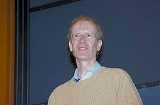
FRS (born 11 April 1953) is a British mathematician
and a Royal Society
Research Professor at Oxford University, specializing in number theory
. He is most famous for proving Fermat's Last Theorem
.
Wiles is the son of Maurice Frank Wiles
(1923–2005), the Regius Professor of Divinity at the University of Oxford and Patricia Wiles (née Mowll). His father worked as the Chaplain at Ridley Hall, Cambridge
, for the years 1952–55. Wiles was born in Cambridge, England, in 1953, and he attended King's College School, Cambridge, and The Leys School, Cambridge.
Wiles discovered Fermat's Last Theorem on his way home from school when he was 10 years old.
I grew up in Cambridge in England, and my love of mathematics dates from those early childhood days.![]()
I loved doing problems in school. I'd take them home and make up new ones of my own.![]()
But the best problem I ever found, I found in my local public library. I was just browsing through the section of math books and I found this one book, which was all about one particular problem -- Fermat's Last Theorem.![]()
Here was a problem, that I, a ten year old, could understand and I knew from that moment that I would never let it go. I had to solve it.![]()
I realized that anything to do with Fermat's Last Theorem generates too much interest.![]()
I really believed that I was on the right track, but that did not mean that I would necessarily reach my goal.![]()
Young children simply aren't interested in Fermat. They just want to hear a story and they're not going to let you do anything else.![]()
Fermat couldn't possibly have had this proof.![]()
I don't believe Fermat had a proof. I think he fooled himself into thinking he had a proof.![]()
But what has made this problem special for amateurs is that there's a tiny possibility that there does exist an elegant 17th-century proof.![]()

